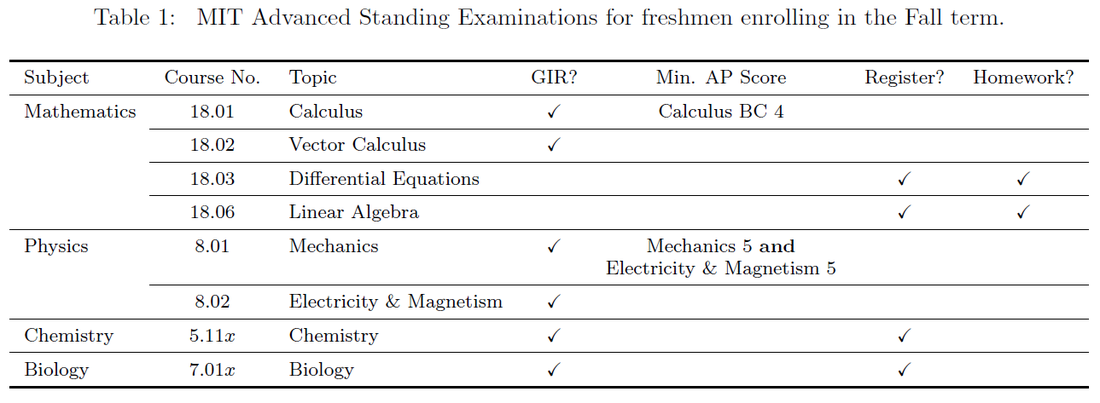|
(This post is for prospective freshmen enrolling in the Massachusetts Institute Technology. I wish I knew all this early enough, so now I'm telling it to you!) You may have some advanced background in mathematics and science subjects prior to enrolling at MIT. In that case, you may be able to skip some basic-level courses and move ahead to take more advanced courses if you prove that you know the content well by
Advanced Standing Examinations MIT works on a "modular" system where there are a large variety of classes, each on one topic, and you are mostly free to choose the classes you want and take them in any sequence; except that among other restrictions,
The following table presents the ASEs offered freshman fall (roughly August to December) that are possible to skip, by topic (not the actual course title). Most of them are for GIRs, except for 18.03 and 18.06, which are required for majoring in mathematics. Some of the classes can be skipped if you score well enough on a related AP exam, and if so the table lists the minimum score needed. Some ASEs require registration by emailing MIT staff; find out how to online. After registering for the 18.03 and 18.06 ASEs, you will receive instructions on what to study and a list of homework problems that need to be completed and submitted on the day of the exam at MIT. Just to give a rough idea of the work involved, both homework packets I received had around 160 problems. Personally, I learned so much from doing that self-study and homework; I might not have passed those two exams if I hadn't prepared as much. Notes on MIT Classes Usually people who skip a class take some other class in its stead. You don't always need to; for most students only the upper limit on the number of hours of classes they choose matters. International students, however, have a minimum number of hours. Freshmen in Fall term are under the coveted "Pass/No Record" protection: if you pass a class the grade shown on your transcript is "P" no matter how well you did or otherwise, and if you fail the class it doesn't show on your transcript. This applies to the grades for ASEs as well. So don't worry about your grades yet! Many of the early MIT classes come in many variants, offering different focuses in content, teaching styles and learning speeds. These variants are interchangeable in terms of fulfilling GIRs or departmental requirements for a major, but they can't all count at the same time. For example, 18.06 and 18.700 both teach Linear Algebra but 18.06 emphasizes matrices more, while 18.700 focuses on abstract linear algebra. You can't have both classes count towards institute requirements, so you might want to reconsider taking the 18.06 ASE and then taking the 18.700 class. Should I take an ASE? Some things to consider before deciding to take any particular ASE:
Conclusion There are many things you need to find out about enrolling at MIT, which may include possible choices to make, such as ASEs. Read up the MIT website to find out about classes, GIRs, ASEs and so on.  MIT Advanced Standing Examinations by Cheng Herng Yi is licensed under a Creative Commons Attribution-NonCommercial-ShareAlike 4.0 International License. Reuse must be accompanied by a link to this article. Download this article:
0 Comments
Leave a Reply. |
Archives
December 2020
Categories
All
|
||||||

 RSS Feed
RSS Feed